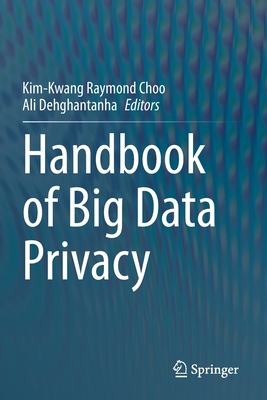Handbook of Big Data Analytics and Forensics
暫譯: 大數據分析與取證手冊
Choo, Kim-Kwang Raymond, Dehghantanha, Ali
- 出版商: Springer
- 出版日期: 2021-12-03
- 售價: $7,850
- 貴賓價: 9.5 折 $7,458
- 語言: 英文
- 頁數: 500
- 裝訂: Hardcover - also called cloth, retail trade, or trade
- ISBN: 3030747522
- ISBN-13: 9783030747527
-
相關分類:
大數據 Big-data、Data Science
海外代購書籍(需單獨結帳)
商品描述
商品描述(中文翻譯)
1. 大數據分析與取證:概述。
2. 隱私、安全與取證挑戰:無人機(UAV)案例研究。
3. 使用基礎設施日誌數據檢測雲環境中的枚舉攻擊。
4. 網路威脅歸因的多視角啟發式分析。
5. 工業網路空間的安全性:線性時間近似的公平聚類。
6. 用於網路物理系統攻擊檢測的自適應神經樹。
7. 評估可擴展的公平聚類機器學習技術在工業控制系統中檢測網路攻擊的性能。
8. 用於工業控制系統的模糊貝葉斯學習進行網路威脅獵捕。
9. 使用監督式機器學習在網路物理系統中檢測網路攻擊。
10. 評估可擴展的公平聚類機器學習方法在網路物理系統中的威脅獵捕。
11. 評估監督式與非監督式機器學習分類器在 macOS 惡意軟體檢測中的表現。
12. 評估物聯網(IoT)惡意軟體操作碼的機器學習算法。
13. 使用監督式機器學習算法進行 macOS X 惡意軟體檢測。
14. 用於 macOS 惡意軟體檢測的機器學習。
15. 使用機器學習技術進行信用卡詐騙檢測的混合分析。
16. 通過自然語言處理(NLP)建模映射 CKC 模型以生成 APT 組報告。
17. 勒索軟體威脅檢測:深度學習方法。
18. 用於物聯網惡意軟體分類的可擴展公平聚類算法。
作者簡介
Since receiving his PhD in 2011, Dr. Dehghantanha has made significant contributions to the fast-moving fields of cybersecurity and cyber threat intelligence. He is a Canada Research Chair in Cybersecurity and Threat Intelligence, and an EU Marie-Curie Fellow Alumni in digital forensics. Dr. Dehghantanha has pioneered the use of ML-based systems for threat hunting in IoT/ICS devices using physical characteristics (e.g. power consumption) as opposed to application-level characteristics (e.g. IP addresses). His works have resulted in an Intrusion Detection System (IDS) for IoT networks; and deep learning models for threat hunting in the edge layer of ICS networks. In 2019, with support from the Department of National Defense Canada, he has developed the first multi-view fuzzy machine learning system for cyber threat attribution. He is among few academics contributing to fundamental research in cyber threat intelligence, with most research taking place in industry settings. His work helps define this new discipline while informing practical strategies. He has built a Cyber Kill Chain-based threat intelligence framework for analyzing banking Trojan campaigns which is widely used to model different attack campaigns, including APT groups activities, analyzing crypto-ransomware campaigns, and analyzing Advanced Persistent Threat (APT) groups targeting critical national infrastructure. He is currently the director of Cyber Science Lab at the University of Guelph, Ontario, Canada.
作者簡介(中文翻譯)
金光雷蒙德·秋於2006年在澳洲昆士蘭科技大學獲得資訊安全博士學位。他目前擔任德克薩斯大學聖安東尼奧分校(UTSA)的雲技術講座教授。他是IEEE計算機學會的傑出訪客(2021 - 2023),並於2020年被Web of Science評選為跨領域的高被引研究者。2015年,他和他的團隊贏得了德國埃爾朗根-紐倫堡大學主辦的數位取證研究挑戰賽。他是2019年IEEE可擴展計算技術委員會(TCSC)可擴展計算卓越獎(中期研究者)的獲獎者,2018年UTSA商學院Col. Jean Piccione和Lt. Col. Philip Piccione終身研究獎的得主,2019年英國計算機學會的Wilkes獎亞軍,2014年澳洲和紐西蘭警務諮詢機構的高度表彰獎,2009年富布萊特獎學金獲得者,2008年澳洲日成就獎勳章的得主,以及2008年英國計算機學會的Wilkes獎得主。他還曾獲得IEEE消費電子雜誌2020年的最佳論文獎、EURASIP無線通信與網絡期刊(JWCN)2019年的最佳論文獎、IEEE TrustCom 2018的最佳論文獎,以及ESORICS 2015的最佳論文獎;2019年韓國資訊處理學會的資訊處理系統期刊(JIPS)調查論文獎(金獎);IEEE區塊鏈2019的傑出論文獎;以及Inscrypt 2019和ACISP 2005的最佳學生論文獎。
自2011年獲得博士學位以來,德赫甘坦哈博士在快速發展的網絡安全和網絡威脅情報領域做出了重要貢獻。他是加拿大網絡安全和威脅情報研究主席,也是歐盟瑪麗·居里獎學金的數位取證校友。德赫甘坦哈博士開創了基於機器學習(ML)系統在物聯網(IoT)/工業控制系統(ICS)設備中使用物理特徵(例如:功耗)進行威脅獵捕的研究,而非應用層特徵(例如:IP地址)。他的研究成果包括針對物聯網網絡的入侵檢測系統(IDS)以及針對ICS網絡邊緣層的深度學習模型進行威脅獵捕。2019年,在加拿大國防部的支持下,他開發了首個多視角模糊機器學習系統,用於網絡威脅歸因。他是為數不多的在網絡威脅情報基礎研究方面做出貢獻的學者,大多數研究發生在產業環境中。他的工作有助於定義這一新學科,同時提供實用策略。他建立了一個基於網絡殺戮鏈的威脅情報框架,用於分析銀行木馬攻擊活動,該框架廣泛用於建模不同的攻擊活動,包括APT組織的活動、分析加密勒索病毒攻擊活動,以及分析針對關鍵國家基礎設施的高級持續威脅(APT)組織。他目前是加拿大安大略省圭爾夫大學網絡科學實驗室的主任。




















